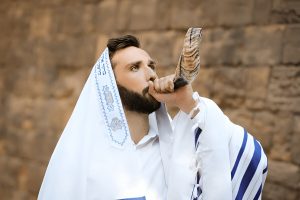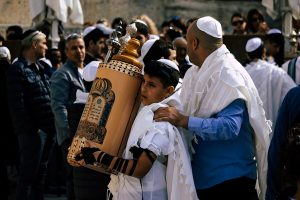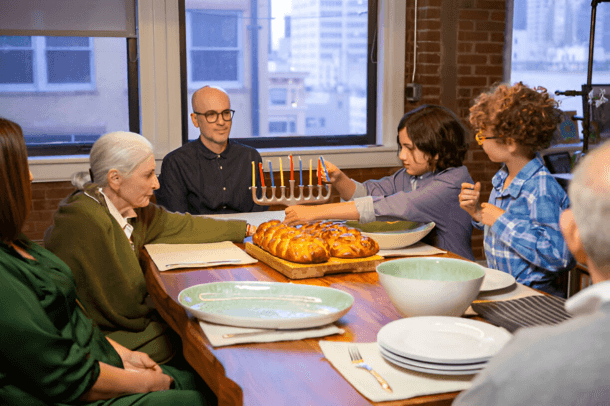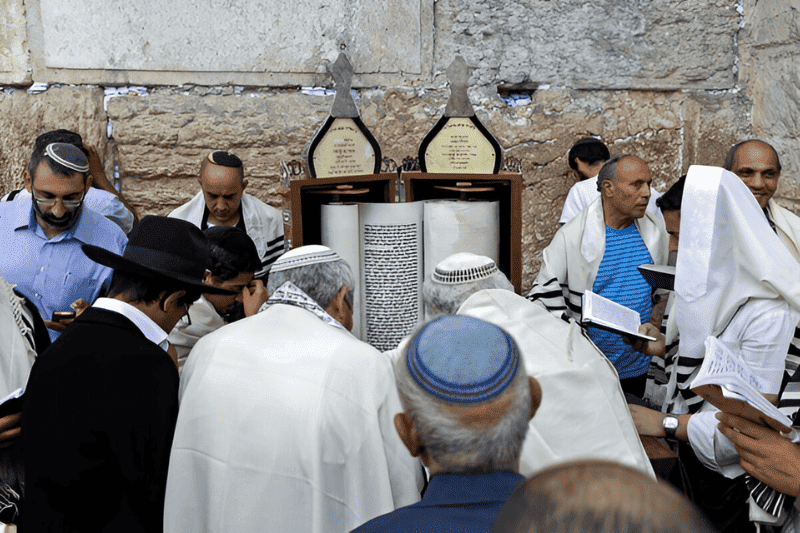It’s time to lighten up your Jewish festivals in 2025. So, you have to start planning for your Jewish festivals in 2025. It’s not too early to start planning, right? In this article, I have mentioned when and how the major Jewish festivals are celebrated. You can also check out the essential information about each festival, so you can start to get an idea of which ones might interest you.
So, what are you waiting for? Start planning your 2025 Jewish celebration today!
Overview of Jewish Festivals 2025
In 2025, the Jewish people will celebrate several festivals. These festivals commemorate key moments in the history of the Jewish people and help to define their identity as a people. The two most important springtime festivals are Pesach (Passover) and Sukkot (Tabernacles).
Pesach commemorates the Israelites’ exodus from Egypt, while the Sukkot celebrates their journey to the Promised Land. Other major Jewish festivals include Shavuot (Pentecost), which commemorates the giving of the Torah at Mount Sinai, and Hanukkah (Feast of Dedication), which celebrates the victory of the Maccabees over the Seleucid Empire.
All of these festivals fall in the autumn or winter months. Each festival has its own unique rituals and customs, which vary from community to community. Jews around the world celebrate these festivals with great joy and enthusiasm, and they provide an important link with their religious and cultural heritage.
History for Celebrating the Jewish Festivals in 2025
The history of the Jewish festivals goes back to the Bible. These are the days when the Israelites were freed from their slavery in Egypt. They were led by Moses to the promised land. These holidays have been celebrated for thousands of years and are very important to the Jewish people.
Rosh Hashanah
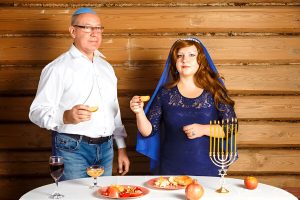 The Jewish New Year, Rosh Hashanah, is a time of celebration and reflection. It marks the beginning of the Ten Days of Repentance, during which Jews reflect on their sins and ask for forgiveness.
The Jewish New Year, Rosh Hashanah, is a time of celebration and reflection. It marks the beginning of the Ten Days of Repentance, during which Jews reflect on their sins and ask for forgiveness.
Rosh Hashanah lasts for two days and is celebrated with a feast that includes traditional foods like apples and honey. It’s also a time for prayer and family gatherings. Special services are held in synagogues, and many Jews take the time to reflect on their relationships with God.
Yom Kippur
Yom Kippur, the Day of Atonement, is one of the holiest days of the Jewish year. It is a day of fasting and reflection and forgiveness for wrongdoing and pledging to make changes in our lives. In 2025, this great festival is celebrated on the 1st and 2nd of October, when the people fast from eating and drinking and focus on their prayer, repentance, and charity.
They also abstain from wearing leather and using electrical devices. Yom Kippur is a time for introspection and to think about how we can make our lives more meaningful. It is a day of reconciliation with God, with ourselves, and with one another.
Sukkot
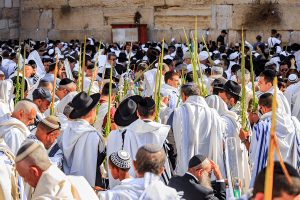 Love the outdoor vibes? Sukkot 2025 is the Jewish festival for you! Also known as the Feast of Booths or Feast of Tabernacles, it is celebrated on the 15th day of Tishrei in September or October according to the Gregorian calendar.
Love the outdoor vibes? Sukkot 2025 is the Jewish festival for you! Also known as the Feast of Booths or Feast of Tabernacles, it is celebrated on the 15th day of Tishrei in September or October according to the Gregorian calendar.
On Sukkot jewish holiday, people build and eat sukkah food, a makeshift hut in which rain can come through. It might be a bit cold eating outside during autumn! But no worries because the hut has to be made out of natural materials and open to the sky, so we can keep cozy using blankets and warm clothes.
The main activities on Sukkot involve rejoicing over our abundance and gratitude for nature’s seasonal harvest. Jews also believe that this was one of the times when Egyptian slaves left Egypt and went into the desert to wander for 40 years.
To commemorate this event, we practice four kinds of rituals during the festival of Sukkot: dwelling in a sukkah, reciting special prayers, waving four species (etrog, lulav, willow branch, and myrtle bough), and performing joyous acts such as dancing and singing.
Simchat Torah
Simchat Torah is one of the hidden gem Jewish festivals. It is celebrated on the evening of 14 Oct, –15 Oct, , which is the seventh month of Tishrei. It honors the conclusion of the annual cycle of public reading from the Torah.
A central feature of the Simchat Torah includes the Hakafot procession, where people march around carrying Torah scrolls decorated with flowers and ribbons. During Simchat Torah, different parts of the synagogue sing together, creating a powerful atmosphere.
Depending on the community’s tradition, this may include special prayers for healing or a good year ahead. Another common activity at Simchat Torah is kiddush, celebrating with wine and food that symbolizes a festive end to the Cycle of Torah.
It’s time for children to carry tiny replicas of TORAH scrolls while they parade around the synagogue, an experience that helps them develop an emotional connection to Judaism and its rituals. Simchat Torah truly captures the joyous spirit of Judaism by coming together to celebrate with entertainment.
Hanukkah
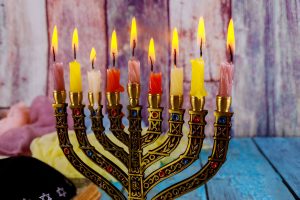
Hanukkah, also called as Chanukkah marks the rededication of the Second Temple in Jerusalem. It is one of the most exciting and meaningful Jewish holidays in which the celebration lasts for eight days and nights, beginning on the 25th day of Kislev.
In 2025, Hanukkah the jewish festival of lights will begin at sunset on 14th of December to 22nd of January. During this time, Jewish families will typically light the menorah (a nine-branched candelabra) and eat fried foods like latkes and sufganiyot.
To celebrate the miracle of the oil that allowed the Maccabees to keep a single flame burning for eight days. Play dreidel (a spinning top game), exchange gifts, and sing traditional songs like “Rock of Ages.”
The Jewish holiday Hanukkah is a time to come together as a community and celebrate faith, heritage, and family and create an annual highlight!
Purim
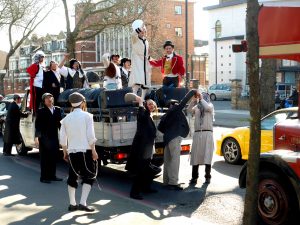 The festival of Purim, a joyous and festive occasion that commemorates the deliverance of the Jewish people from great danger in ancient Persia. On this day, Jews celebrate by dressing up in costumes, exchanging gifts, and eating traditional food such as pastries called Hamantaschen.
The festival of Purim, a joyous and festive occasion that commemorates the deliverance of the Jewish people from great danger in ancient Persia. On this day, Jews celebrate by dressing up in costumes, exchanging gifts, and eating traditional food such as pastries called Hamantaschen.
During Purim services, congregants read the story of Esther from the Megillah or Scroll of Esther. This is a festive event filled with music and noise to celebrate and remember this significant moment in Jewish history.
Children also dress up and bring noisemakers called graggers to drown out any mention of wicked Haman’s name during the reading. Many also give tzedakah (charity) during Purim to those less fortunate and enjoy Purim holiday food with family and friends.
Pesach
 Pesach, also known as Passover, (pesach passover) is one of the most widely celebrated Jewish festivals. It marks the passage from slavery to freedom, which is celebrated on the evening of Sat, 12 Apr – Sun, 20 Apr for eight days.
Pesach, also known as Passover, (pesach passover) is one of the most widely celebrated Jewish festivals. It marks the passage from slavery to freedom, which is celebrated on the evening of Sat, 12 Apr – Sun, 20 Apr for eight days.
During this time, Jews abstain from eating chametz, which is any type of leavened product made from wheat, barley, rye, spelt, or oats. Instead, they consume only matzo (unleavened bread). The festival is also observed by engaging in well-known rituals such as the cleaning of the house to remove all traces of chametz and the reading of the Haggadah at dinner each night.
During Pesach, it’s also traditional to visit family members and reconnect with our loved ones while honoring an important tradition.
Shavuot 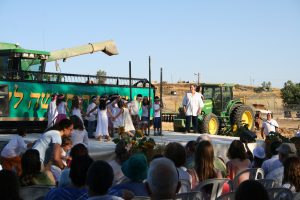
Shavuot is one of the most beloved Jewish festivals and is celebrated seven weeks after the start of Jewish Passover. Shavuot is the commemoration of God giving the Ten Commandments to Moses on Mount Sinai. This festival is typically celebrated for two days and includes lots of delicious food, dancing, and prayer.
One of the biggest traditions associated with Shavuot is eating cheesecake and other dairy products. This originates from a midrash that says that when God gave the Torah at Mount Sinai, our mouths were full of milk and honey. The custom to prepare dairy dishes for Shavuot to celebrate this moment has been around for centuries!
On this festive day, people also often decorate their homes as an ode to the natural beauty surrounding Mount Sinai at the time the Torah was received. So if you’re looking forward to celebrating jewish holiday Shavuot in 2025, mark your calendar now and get ready for a day full of festive traditions!
Shabbat
Shabbat is the Jewish day that has played an important role in Jewish life for centuries and is considered a sacred and special time for Jews around the world. During this time, it is customary to light candles and bless the wine, in addition to attending synagogue services.
On Shabbat, it is forbidden to do any kind of creative work as well as activities like driving and using electrical devices. On Shabbat day, many Jews will spend the afternoon with family in their homes leisurely eating meals and discussing religion or other topics. Jews around the world celebrate this holy day according to their traditions and customs.
Find the perfect guide to enjoy your foods in Kosher Restaurants during the biggest jewish holidays which follow the dietary laws of Judaism.
Shemini Atzeret
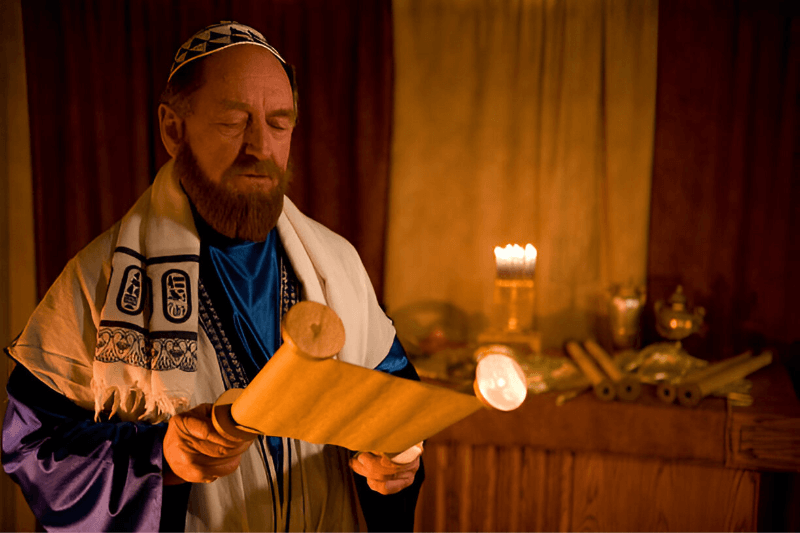 Shemini Atzeret is the most important Jewish holiday that celebrates the end of the harvest season. It is observed on the 22nd day of the Hebrew month of Tishrei, which usually falls in September or October.
Shemini Atzeret is the most important Jewish holiday that celebrates the end of the harvest season. It is observed on the 22nd day of the Hebrew month of Tishrei, which usually falls in September or October.
This festival is one of the most important days of the year for Jewish people, and it is traditionally celebrated by spending time in prayer and reflection. Shemini Atzeret also marks the beginning of the Jewish holiday of Sukkot traditions.
Tisha B’Av
Tisha B’Av is the saddest day on the Jewish calendar. It’s a day of mourning that remembers the destruction of both the first and second temples in Jerusalem. And it’s a day when we mourn all of the other tragedies that have befallen the Jewish people over the years.
It’s a somber day, marked by fasting and prayer. And many Jews spend it in a synagogue, listening to stories of loss and lamenting our broken world. So, there you have it for all the Jewish festivals and holidays for August 3, 2025.
Wrap Up
Get into the paradise world of Jewish peoples, which helps you to celebrate your festivals. This blog insists you, when and how those important holidays are celebrated with their families. Along with that, know the traditions that are followed and the history of those great festivities.
You can celebrate your vibrant holidays by staying in the HolidayKeepers where you can delight in hospitality along with the essential amenities. Contact them for further inquiries and make memorable memories.
FAQs
Q: What is the Jewish calendar?
A: The Jewish calendar is a lunar-solar calendar used by Jews to determine the dates of religious observances and holidays.
Q: What are the major Jewish festivals?
A: The major Jewish festivals are: Passover, Shavuot, Rosh Hashanah, Yom Kippur, Sukkot, Hanukkah, and Purim.
Q: What is Passover?
A: Passover festival is a Jewish holiday that celebrates the liberation of the Israelites from slavery in Egypt and their journey to the Promised Land. It is observed for eight days starting on the 15th day of the Jewish month of Nisan.
Q: What is Hanukkah?
A: Hanukkah is the festival of lights that celebrates the miracle of oil that burned for eight days in the Temple in Jerusalem after the Maccabean victory over the Greek-Syrians. It is observed for eight days starting on the 25th day of the Jewish month of Kislev.
Q: What is Purim?
A: Purim is a Jewish holiday that celebrates the salvation of the Jewish people in the ancient Persian Empire as recorded in the Book of Esther. It is observed on the 14th day of the Jewish month of Adar.


